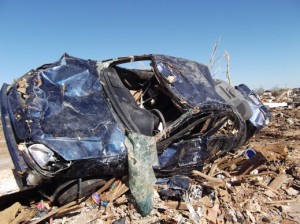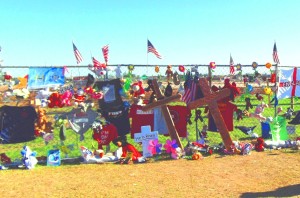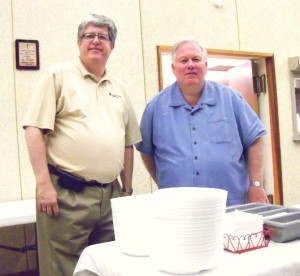With the passing of Leon Phillip last week, the person we consider the founder of Lutheran Disaster Response, we have asked Gilbert B. Furst to share some reflections on his life and ministry. We appreciate Gil taking the time to share these thoughts.
Leon A. Phillips, Jr. was greater than the sum of his parts. Leon, who died peacefully in his sleep last week, was an extraordinary person, family member, pastor, church leader, and director of Lutheran Disaster Response. His love and insight touched countless thousands of lives around the world. He brought hope to the hopeless, help to the helpless.
A brief history of Lutheran Disaster Response will provide a context for Leon’s disaster ministry. LDR emerged after the 1972 Hurricane Agnes flooded northeast Pennsylvania. Leon, who lost his home and most of his possessions, coordinated thousands of volunteers and material donations. In 1973 the Lutheran Church in America, The Lutheran Church-Missouri Synod, and the American Lutheran Church discussed how disaster response could be part of the church’s ministry on a national level. The Lutheran Council USA oversaw an advisory committee of representatives appointed by the three church bodies. Disaster response was a small-scale program providing some training and sending small grants to places where there were disasters. Leon was appointed to be an LCA representative.
In the late ‘70s and early ‘80s many inter-Lutheran programs were cut back due to financial pressures and church issues. As the Evangelical Lutheran Church merger was planned, The LC-MS and the emerging ELCA agreed on three primary areas of inter-Lutheran cooperation: Lutheran World Relief, Lutheran Immigration and Refugee Service, and inter-Lutheran Disaster Response. An LDR board with ELCA and LC-MS representatives met for the first time in December 1987. One-fourth of Leon’s time was designated as LDR director.
Leon visualized a system that could expand during emergencies and shrink when there were none. He believed social ministry organizations could manage local programs, handle finances and volunteers. He trained a group of consultants, many from social ministry organizations. The consultant program worked well following Hurricane Hugo, in St. Croix, in Charleston, the Isle of Palms, and South Carolina coastal islands.
In 1992 Leon’s quarter-time position increased and he became the first full-time director. That year Hurricane Andrew hit South Florida and Hurricane Iniki struck Hawaii. In 1993 a major earthquake hit Oakland and San Francisco.
Lutheran cooperation came quickly and was deep. Leon also reached out to work with other church denominations, as well as FEMA, and the American Red Cross.
Leon was aware of clergy attrition following Hurricane Andrew. He had an LC-MS pastor-psychologist study the situation, and his conclusions led Leon to change response priorities. “Care for the Caregivers” became a primary focus. Over the next decade trained psychologists, counselors, and theologians provided care for pastors and caregivers, working through ELCA Synod Bishops and LC-MS District presidents.
Leon expanded the scope of disaster response to include human-caused intentional disasters (such as the Oklahoma City bombing) and technological disasters (such as the Times Beach chemical leaks).
During his ten years as director and response to 150 disasters, Leon developed a national network of responding agencies. His vision provided LDR with an effective means of carrying out responses, and enabled agencies to draw closer to meet the needs of their communities. When Lutheran Services in America was organized in 1997, a pattern was set to provide for the needs of disaster survivors.
Leon provided a strong confessional-rooted theological approach to disaster response, and he saw LDR as an integral part of the church’s ministry and life. Under his leadership Lutherans were relied upon for case management, rebuilding, advocacy, pastoral care and spiritual care.
The needs of children traumatized by disasters became apparent following tornadoes in southwest Minnesota. In cooperation with LSS-Minnesota, Camp Noah became a ministry program for disaster-affected children across the country.
Leon once told me, “Each disaster was an affirmation that God finds resources and ways of lifting people up…the church in action….”
Leon was not constrained by “ordinary” practices. He often carried a pocketful of cash – much to the consternation of church officials – and distributed it to pastors following disasters. He felt that “$50 now when it is needed is worth ten times that much in two months.”
One agency executive recalls, “In 1997 in the early days of the Red River flood that occasioned the evacuation of 60,000 people, at the NW Minnesota Synod office a pastor and his wife came into the office. Leon was standing by the front desk. Before the pastor said a word, Leon said: ‘do you have a place to stay tonight?’ ‘No.’ Leon turned to me and said, ‘Go get a key.’ Dutifully I went into the conference room and got a key to a motel room and returned. Leon gave the key to the pastor and said, ‘Now, tell me your story.’ The pastor did, confessing his conviction he could be of no help to his people. Leon dug into his pocket and pulled out a thick wad of $50 bills. He said: ‘Here; Take this. Find your people. Tell them the church cares.’ The pastor did and became one of the heroes of the Red River Valley flood.”
If your life was touched by Leon, your life was changed. Many are attesting to the influence Leon had in their lives. Here are some of their remarks:
· “He was truly and in all sincerity a man with a great heart. And one to be remembered for what he did for others.”
· “God’s peace to one who was such a gentle spirit among us. Prayers for all who feel the loss of this loved one.”
· “Leon helped me understand what it meant to be a pastor and what it meant for us to be a community of faith in immediate, concrete ways!”
· “Rest in peace, brother Leon, God’s servant!”
· “We are better people knowing him. Working with him over the years was a true blessing.”
· “We have been blessed and enriched by his life that he shared so generously.”
· “A great and faithful and graceful guy.”
· “He was a gentle man full of knowledge and compassion. Enjoyed working with him.”
· “A fine man who was committed to service. I learned so much from him. Well done good and faithful servant. Rest in peace.”
· “He changed my life forever as did you Gil. I am so much richer for knowing him. Rest now Leon.”
· “We all stand on the shoulders of greats who have gone before us in the faith. What a heritage we have!”
I add my simple personal words. It has been my privilege and blessing to know Leon over the years as a colleague, pastor, travel companion, and most-of all, friend. We were together in an amazing number of places and situations, from floods in Fargo to balconies in Budapest; from Virgin Island hurricane destruction to tuk-tuks in Bangkok; from German halls to San Antonio floods; from Denver courthouses to Prague cathedrals; from celebrating life with East Germany colleagues to enjoying friends on his patio. He was my colleague, my mentor, my friend.
So we say “ave atque vale“ – “Hail and Farewell.” Thanks be to God for Leon’s partnership in a multitude of ministries through these years; for his creativity, sensitivity, warmth, support, leadership, guidance; and for his personal friendship. We give thanks for his life, rejoice in his faith, and mourn his passing.



